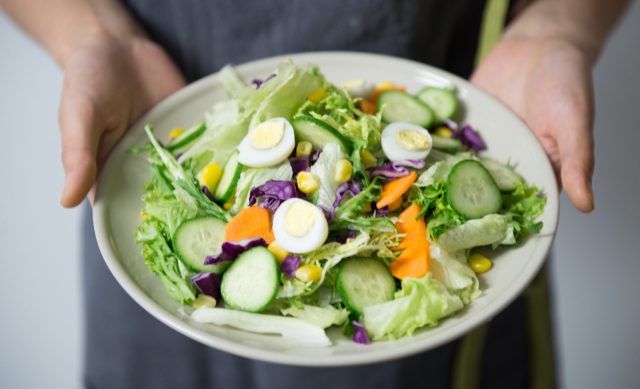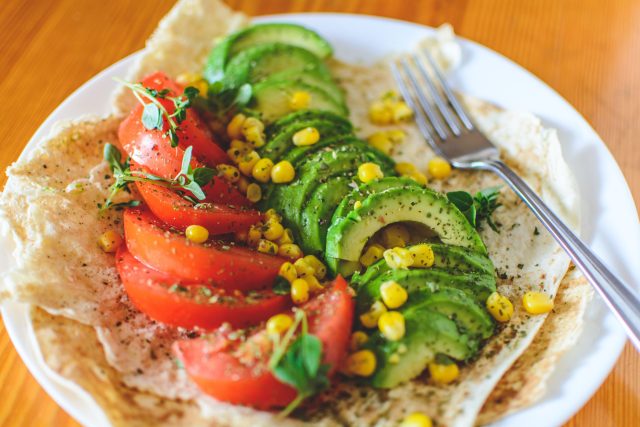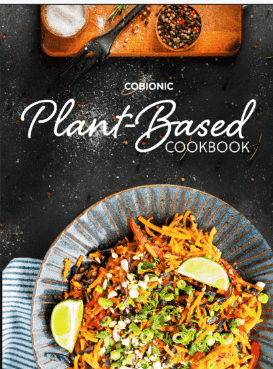5 Plant-Based Diets For Beginners: Complete Guide 2024
By Vanessa Richards
January 10, 2024 • Fact checked by Dumb Little Man

Are you considering going plant-based but don't know where to start? To be honest, transitioning to a plant-based diet can seem daunting. But guess what?
This comprehensive guide will teach you everything you need to know about starting a plant-based diet for beginners. From the basics of veganism to more advanced topics like meal planning and grocery shopping.
You'll learn about the benefits of a plant-based diet and get tips on how to make the switch easy and sustainable.
So whether you're a complete beginner or just looking for extra advice, read on for all the information you need to get started on your plant-based journey! You'll be feeling healthy and happy in no time!
Plant-Based Diet For Beginners: What is a Plant-Based Diet?

A plant-based diet focuses on consuming whole plant foods. This way of eating has many benefits, including improved health, a smaller environmental footprint, and increased energy levels. Some people eat a plant-based diet for ethical reasons, as it typically involves consuming fewer animal products.
For others, the appeal lies in that plant-based eating can be delicious and nutritious. There are many different ways to eat a plant-based diet, and there is no one right way to do it.
The key is to focus on eating whole, unprocessed foods from plants. This could include fruits, vegetables, whole grains, legumes, nuts, and seeds. By filling your plate with these nutrient-rich foods, you'll be well on your way to eating a plant-based diet.
5 Different Types of Plant-Based Diets
Food plant-based diets are becoming more popular as people learn about the many benefits of eating plant-based meals.
While there are many different plant-based diets, they all have one thing in common, they focus on eating whole, unprocessed foods from plants. This includes fruits, vegetables, grains, nuts, and seeds.
People who follow a plant-based diet typically avoid meat, dairy, eggs, and other animal-based products.
There are a variety of plant-based and vegan diets that people can follow. Some popular ones include the following:
1. The Raw Food Diet
This diet consumes uncooked and unprocessed plant foods. Some people choose to eat raw food, while others will include a small amount of cooked food in their diet.
2. The 80/10/10 Diet
This diet is also known as the low-fat, raw-food vegan diet. It focuses on consuming 80% of calories from carbohydrates, 10% from protein, and 10% from fat.
3. The Starch Solution
This diet is based on the idea that starches are the healthiest type of food for humans to eat. It includes foods such as potatoes, rice, and other starchy vegetables.
4. The Vegan Mediterranean Diet
The diet is based on the traditional Mediterranean diet but excludes all animal products. It includes a variety of plant-based foods such as fruits, vegetables, whole grains, and beans.
5. The Raw Till Four Diet
This diet involves eating a plant-based diet until 4 pm and consuming a raw vegan meal for dinner.
There are many reasons why people may choose to eat a plant-based diet. Some people do it for health reasons, as studies have shown that plant-based diets can help reduce the risk of chronic diseases such as heart disease, stroke, and diabetes.
Others may eat plant-based for environmental reasons, as livestock production is a major source of greenhouse gas emissions. And still, others simply enjoy the taste and variety of plant-based foods.
Advantages of Going on a Plant-Based Diet

A plant-based diet focuses on plants for food. This can include vegetables, fruits, whole grains, legumes, nuts, and seeds. Plant-based diets are not necessarily vegetarian or vegan. Some people who follow a plant-based diet may occasionally eat meat, dairy, or eggs. There are many advantages to following a plant-based diet.
Here are the most common plant-based diet benefits.
One benefit is that plant-based diets are typically lower in calories than diets that include meat and other animal products. This can help with weight loss or weight management.
For example, plant-based diets have been linked to a lower risk of cardiovascular disease, obesity, and type 2 diabetes. They have also been shown to reduce inflammation, and high blood pressure and improve gut health.
In addition, plant-based diets are generally high in fiber and low in saturated fat, making them an ideal way to eat for those looking to lose weight or maintain a healthy weight.
Following a plant-based diet can also have environmental benefits. Agriculture is a leading cause of greenhouse gas emissions, and animal products require more resources to produce than plant-based foods.
With so many benefits, it’s no wonder that more and more people are choosing to go on a plant-based diet.
Disadvantages of Going on a Plant-Based Diet
While a plant-based diet has many potential benefits, some disadvantages should be considered.
One of the most significant disadvantages is that getting all the nutrients your body needs from plants alone can be challenging. This is because many essential nutrients, such as vitamin B12 and iron, are found in animal products.
As a result, people who follow a plant-based diet may need supplements to ensure they get enough of these vitamins and minerals.
Additionally, whole-food plant-based diets can be expensive, as they tend to rely heavily on fresh fruits and vegetables, which can be costly.
Finally, some people simply don't enjoy the taste of a plant-based diet. While there are many health benefits associated with this type of diet, it's not right for everyone.
Sample Plant-Based Foods

Living a plant-based lifestyle is not only good for your health, but it’s also good for the environment. Plant-based foods are packed with nutrients and fiber and are low in calories and fat.
Plus, plant-based beverages are a great way to stay hydrated. Here are some sample plant-based foods and beverages that you can enjoy as part of a healthy plant-based lifestyle:
- Fruit: apples, bananas, oranges, berries, grapes, melon
- Vegetables: carrots, celery, cucumber, kale, spinach, tomatoes
- Legumes: beans, lentils, peas
- Nuts and seeds: almonds, walnuts, flaxseeds, chia seeds
- Milk: almond milk, cashew milk, soy milk
- Dairy products: coconut yogurt, almond yogurt
- Cheese: vegan Parmesan cheese, vegan cheddar cheese
- Meat: tofu, tempeh, seitan
- Ice cream: coconut ice cream, almond ice cream
- Coffee: black coffee, iced coffee with plant-based milk
- Tea: herbal tea, green tea, and black tea
What Foods To Avoid?
A plant-based diet primarily uses plant foods, including vegetables, grains, nuts, seeds, and legumes. While there are many benefits to following a plant-based diet, some foods should be avoided. Refined and processed foods, for example, are often high in unhealthy fats, salt, and sugar.
They can also contain additives and preservatives that can harm your health. Instead of processed foods, focus on eating whole, unprocessed foods rich in nutrients.
These include fresh fruits and vegetables, whole grains, legumes, and nuts. Following a healthy plant-based diet can enjoy all the benefits plants offer while avoiding the negative effects of processed foods.
Sample Plant-Based Diet Plan
A plant-based diet focuses on whole, unprocessed plant foods. This diet has been shown to have numerous health benefits, including a lower risk of heart disease, obesity, and type 2 diabetes.
There are many delicious options if you're interested in trying a plant-based diet. Here's a sample plant-based diet plan that can help you get started:
Breakfast
Start your day with a nutritious smoothie made with fresh fruits and vegetables, or enjoy a bowl of oatmeal topped with almonds and berries.
Lunch
Try a hearty vegetable soup or salad loaded with fresh greens, beans, and other colorful veggies for lunch. Add whole-grain bread for extra fiber and nutrients.
Dinner
For dinner, enjoy a veggie burger on a whole wheat bun or roast some broccoli and sweet potatoes in the oven. Serve with a side of quinoa or brown rice for a complete meal.
Snacks
Snack on healthy foods like fruits, nuts, seeds, and veggie sticks throughout the day. These foods will help you stay energized and satisfied between meals.
Where to Get Plant-Based Diet Ideas
If you’re interested in trying a food plant-based diet, plenty of resources are available to help you get started.
There are cookbooks full of delicious plant-based recipes, online food delivery services that make it easy to order plant-based meals, and even food subscription boxes that send you everything you need to make a plant-based meal at home. With so many options available, there’s no excuse not to try food plant-based diets!
A. 105 Easy Plant-Based Recipes: Cobionic Plant-based Cookbook
Looking for a plant-based cookbook packed with delicious recipes and meal ideas? Check this out. This cookbook was designed with one goal in mind – to make it easy and fun to enjoy a healthy, plant-based diet.
This cookbook has about 105 recipes, so you get to have a huge variety to choose from. The recipes in this cookbook are ideal for helping people on their weight loss journey by consuming a plant-based diet.
The author says that these recipes can assist people to gain the physique they want. Also, they are effortless to cook and delicious to eat. They are the solution for reducing fat as they do not have any dairy products and are best for vegetarians.
What's even more interesting?
Each recipe in Cobionic is packed with nutrient-rich ingredients that are good for you and taste great! From hearty breakfasts to satisfying dinners, you’ll find something for every meal of the day. And best of all, each recipe is simple to follow and can be made using common kitchen ingredients.
So whether you’re looking to transition to a plant-based diet or simply want to add more healthy options to your meals, Cobionic is the perfect cookbook for you!
Shop The Plant-Based Cookbook at the Official Website.
Full Article: The Plant-Based Cookbook Review 2024: Best Vegan Cookbook?
B. 200 Vegan Recipes: Veganify Cookbook
This cookbook is packed with 200 vegan recipes sure to please everyone in the family. We've covered you whether you're looking for breakfast, lunch, dinner, or dessert. Our recipes are healthy and nutrient-rich, so you can feel good about your eating. And best of all, they're all 100% vegan!
This book is ideal for beginners in veganism as it helps them gain all the necessary knowledge about a plant-based or vegan diet. It contains all the recipes to prepare natural foods for a healthier lifestyle.
Suppose you are at this risk of cardiovascular issues and are looking for ways to prevent it through your diet. Then this cookbook is the perfect solution. It contains recipes that are beneficial for reducing the incidence of cardiovascular problems. These recipes will also help you achieve radiant skin and boost your energy levels.
What's even more interesting?
This book is also available online, so you can easily download it at your convenience. It contains comprehensive instructions with a combination of aesthetic illustrations that makes it easy to follow this program.
This book is not only for vegans; it can also benefit non-vegan people who want to try a plant-based diet. The recipes in this Veganify cookbook contain all the necessary vitamins and nutrients that benefit everyone. It gives you all the ideas to prepare a delicious and healthy meal.
Shop Veganify Cookbook at the Official Website.
Full Article: Veganify Cookbook Reviews 2024: Does it Really Work?
Probable Risks of Switching To A Plant-Based Diet
While a plant-based diet has many health benefits, there are also some potential risks. Here are some of the most common risks associated with switching to a plant-based diet:
You may miss out on essential nutrients
A plant-based diet can lack essential nutrients such as vitamin B12, iron, and omega-3 fatty acids. This is why it's essential to be careful when switching to a plant-based diet and ensure that you get enough of these essential nutrients. Taking supplements can help to fill any nutrient gaps.
You may experience digestive issues
If you're not used to eating a lot of fiber, you may experience digestive issues such as bloating and gas when you first start eating a plant-based diet. Again, taking things slowly and gradually increasing your fiber intake is essential. Drinking plenty of water and including fermented foods in your diet can also help with digestion.
You may have trouble getting Enough protein
While getting enough protein on a plant-based diet is possible, it can be more complex than if you were eating animal products. Eating various protein-rich plant foods, such as beans, lentils, nuts, and seeds, is important. You may also want to consider taking a protein supplement.
You may feel tired at first
When you switch to a plant-based diet, your body will adjust as it gets used to burning carbohydrates for energy instead of fat. This can lead to fatigue, especially in the first few weeks. Stick with it, though – once your body adjusts, you'll have more energy than ever!
You may miss certain foods
If you're used to eating a lot of meat and dairy, you may miss these foods when you switch to a plant-based diet. However, many delicious plant-based alternatives are available (such as vegan cheese and Impossible Burgers) that can help ease the transition.
Precautions To Take When Switching To a Plant-Based Diet
A plant-based diet can be a healthy way to eat, but there are some precautions you should take when making the switch.
First, it's important to ensure you're getting enough plant protein. Protein is essential for building and repairing muscles, so you'll need to find other protein sources if you're not eating meat.
Good sources of plant-based nutrition include nuts, seeds, beans, and tofu. You'll also need to make sure you're getting enough iron. Iron helps carry oxygen to your cells, and it's found in food like dark leafy greens, lentils, and quinoa.
You may also want to consider taking a vitamin B12 supplement since this vitamin is only found in animal products. If you're considering switching to a plant-based diet, talk to your doctor first to ensure it's right.
Conclusion
Now that you know the basics of a plant-based diet, it’s time to start. Remember, there are no hard and fast rules – do what works for you. If you struggle, talk to a registered dietitian or nutritionist who can help tailor a plan that meets your specific needs and taste preferences.
With a little planning and effort, switching to a plant-based diet is easier than you might think. And, once you do, you’ll reap the many rewards – physical, mental, and environmental – for years to come. Here's our top recommendation for the best plant-based vegan diet cookbook designed to keep you on a healthy diet.
Plant-Based Cookbook is filled with hearty meals and tasty recipes that are all plant-based, so you can enjoy all the flavor without the guilt.
Each recipe is packed with nutrients and flavor, so you can feel good about what you're eating while still getting all the satisfaction of a delicious meal.
Click here to Get The Plant Based Cookbook at a Discounted Price.
>>Related Article: Vegan Diet Plan for Beginners: Complete Guide 2024
Plant-Based Diet Plan For Beginners FAQs
How long does a plant-based diet take to start working?
There is no one-size-fits-all answer to this question, as the amount of time it takes for a plant-based diet to start working will vary depending on several factors, including a person's age, health status, and the severity of their condition.
However, in general, most people will experience improvements within a few weeks to a few months of switching to a plant-based diet. This is because plant-based foods are typically more nutrient-dense than animal-based foods and are also more accessible for the body to digest.
Are plant based diets healthier for the human body?
Studies have shown that a plant-based diet can help to lower blood pressure and cholesterol levels, reduce the risk of heart disease and diabetes, and promote weight loss. Additionally, plant-based diets are often high in fiber and antioxidants, which can protect against cancer and other chronic diseases.
Furthermore, plant-based diets have been shown to promote weight loss and improve overall health. For these reasons, many experts believe that a plant-based diet is the best way to eat for the human body.
Is plant based eating sustainable?
Supporters of plant-based diets say that with proper planning and management, they can be sustainable in the long term. They point to the fact that many countries have successfully increased their production of fruits and vegetables in recent years.
They also argue that a shift to plant-based diets would reduce demand for meat, which is a major contributor to greenhouse gas emissions. Whether or not plant-based diets are sustainable is still an open question. However, there is evidence to suggest that they can be part of a sustainable future with proper planning.
Vanessa Richards
Vanessa is a mom of 3 lovely children and a software geek. Outside of her career as a health and wellness instructor. She enjoys writing and researching on topics such as finance, software, health and culinary.




